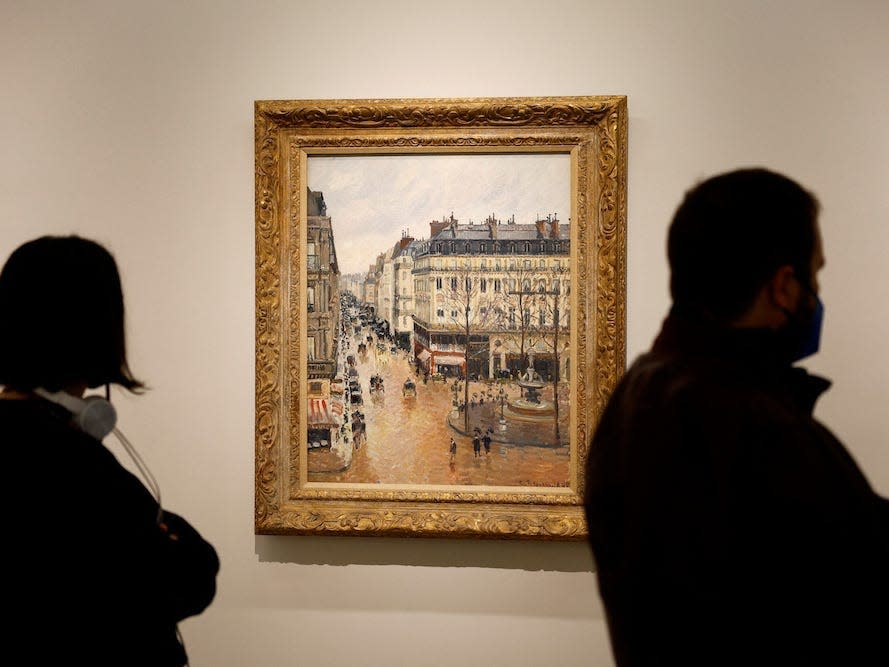Jewish groups in Spain are troubled by their government's decision to cling onto a painting looted by the Nazis

A US court decided a Nazi-looted painting in Spain needn't be returned to the family of its original owner.
The decision shocked the family, as well as Spain's own Jewish community.
A lawyer for one group said it's "unbelievable" that Spain doesn't return the painting.
In a shock legal decision earlier this month, a California court determined that Spain has the right to hold onto a valuable painting looted by the Nazis rather than returning it to the family of the Jewish woman it was stolen from.
The decision has appalled the family, and those in the Jewish community. Spain's leading Jewish organization has long supported the family's legal fight to wrest the painting from the Spanish museum that holds it.
"It's simply unbelievable that Spain is refusing to fulfill its international commitments," Bernardo Cremades, a lawyer representing the Federation of Jewish Communities in Spain, or FCJE, told Business Insider.
Meanwhile, the Federation of Young Jews in Spain, or FEJJE, told BI that the decision of the Spanish government to cling on to the painting "perpetuates a cycle of dehumanization."
The fight to return a precious artwork
In 1939, Jewish collector Lilly Neubauer was forced to sell "Rue Saint-Honoré in the Afternoon. Effect of Rain," by impressionist Camille Pissarro, to the Nazis as she attempted to flee Germany.
After the war, Neubauer believed it lost, and claimed reparations for its then-value from Germany.
The painting is now reckoned to be worth about $30 million, according to The Guardian.
The painting spent years bouncing around auction houses and collections until it was bought by a Spanish noble, Baron Hans Heinrich Thyssen-Bornemisza, in 1976.
His collection was later declared the property of a state-backed nonprofit foundation, and went on display in the Museo Nacional Thyssen-Bornemisza in Madrid.
Neubauer's Californian descendants, the Cassirer family, spotted the painting in the collection in 2000, and have been fighting for its return ever since.
Lawyers for Neubauer's descendants contend that Spain is obliged, under multiple international agreements about the spoils of war, to return the painting, as the Los Angeles Times reported.
But on January 9, the US 9th Circuit Court of Appeals said that the painting could remain in Spanish hands.
An 85-year battle
"We've been standing by the family all along," said Cremades, who was retained by the FCJE in 2017 to support the Cassirers' claims in court.
Cremades said that the FCJE doesn't want to engage in any sort of quarrel with the Spanish government, but "just want to inform the court that this painting should be returned to the rightful owners."
But the FEJJE's spokesperson went further, calling the Spanish state's position "unacceptable."
Acknowledging the legal complexity of the case, the spokesperson said that returning goods looted in the Holocaust is nonetheless an act of "historical and moral justice" that should not be disregarded.
Inconsistent decisions
Cremades said the Spanish government's position on the painting is "kind of incoherent," since it recently took steps to return art looted by the government of dictator Francisco Franco, which ruled the country from 1939 to 1975.
Works such as "Portrait of a Young Knight," painted in 1623 by Dutch portrait artist Cornelis van der Voort, were handed back to the descendants of Ramón de la Sota y Aburto, a persecuted Basque politician, in 2022, El Debate reported.
Cremades suggested that this sort of restitution in Spain wins more votes than doing the same for Holocaust victims.
"It was presumably politically driven," he said.
The museum, for its part, welcomed the US court's decision, while declining to comment on the views of the Jewish community in Spain.
Ernest Urtasun, Spain's culture secretary, said in a statement shared with BI that "we have to respect" the US court's decision.
He noted that Spain "could have followed" international restitution agreements, but added: "I don't go into speculations about what we would have done because we have a sentence."
The 'tip of the iceberg'
The case, as argued in the 9th Circuit, did not address the question of Spain's obligations under international restitution agreements but was instead restricted to the question of processing stolen goods, and which country's laws should be followed.
Nobody disputes that the painting was stolen. Californian law doesn't give owners rights over stolen goods. But in Spain, if you buy stolen goods in good faith, you have stronger claims.
The question was whether to apply Spanish or Californian law — and the court decided Spain should win out.
Even so, one of the three judges, Consuelo Callahan, said that while the decision may be legally sound, it conflicted with her "moral compass." She called on the Spanish government to voluntarily relinquish the painting.
The decadeslong case is one of many that have passed through courts internationally. The FEJJE spokesperson said it was the "tip of the iceberg" for those dispossessed "during one of the darkest episodes in the modern history of the Jewish people."
Read the original article on Business Insider


